Usage
This page will summarize all features related to this shop-browser.
Paginated Display
Page Navigation
Navigate to either the next- or the previous page, or quickly jump to the very first- or last page.
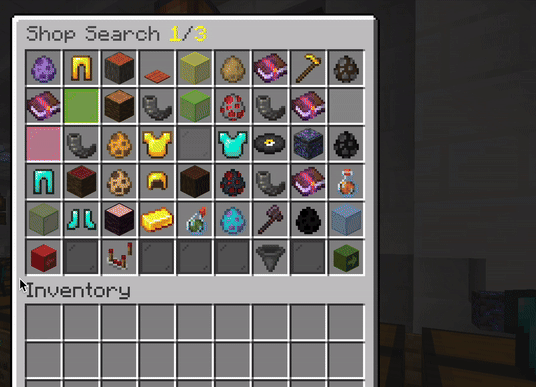
Shop Details
A rich preview of details regarding each individual shop, which not only offers actions to either teleport to the destination or open the native preview, but also updates in real time.
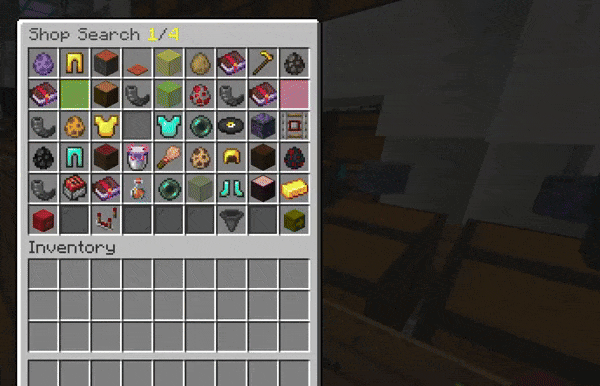
Sorting Results
Create your very own sorting-setup by choosing from an extensive list of criteria; each entry can either be disabled (taking no effect), or be toggled between ascending (+) and descending (-); to decide sorting-precedence, individual entries may be moved. Your choices will be remembered, as to ensure future results being displayed in a personalized manner. You can reset your selection with merely the click of a button at any time!
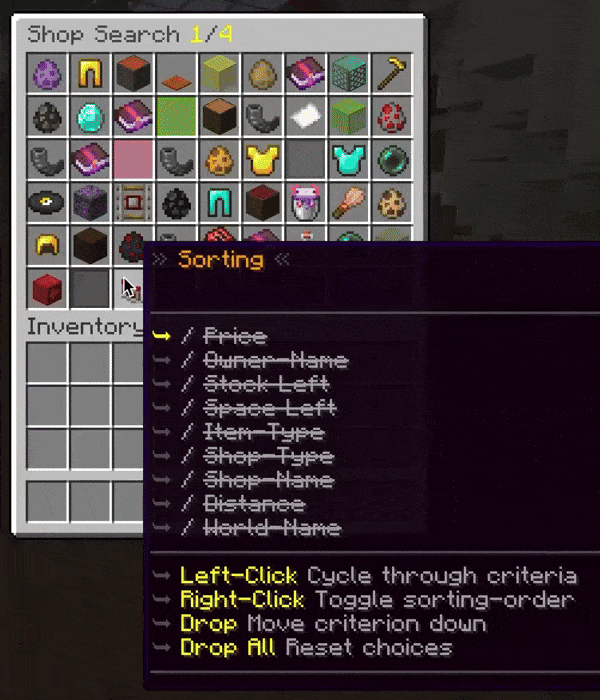
Filtering Results
Filter results based on your exact requirements: criteria combines conditionally, meaning that all selections need to apply to any given shop. Your choices will be remembered, as to ensure future results being displayed in a personalized manner. You can reset your selection with merely the click of a button at any time!
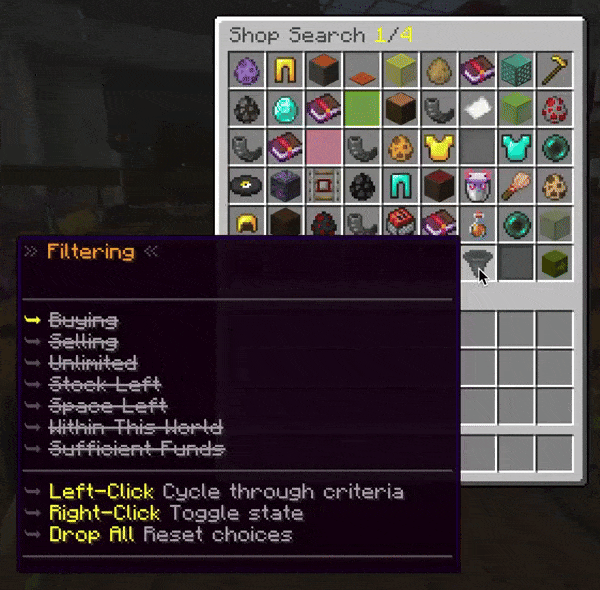
Search-Flags
Search-flags represent additional criteria to be met by the browser's entries, allowing to specify properties like the shop-owner, the radius (relative to the command-executor), and much more; use dash-notation, which supports auto-completion - just remember to insert them prior to the actual item-predicate, as to avoid ambiguity.
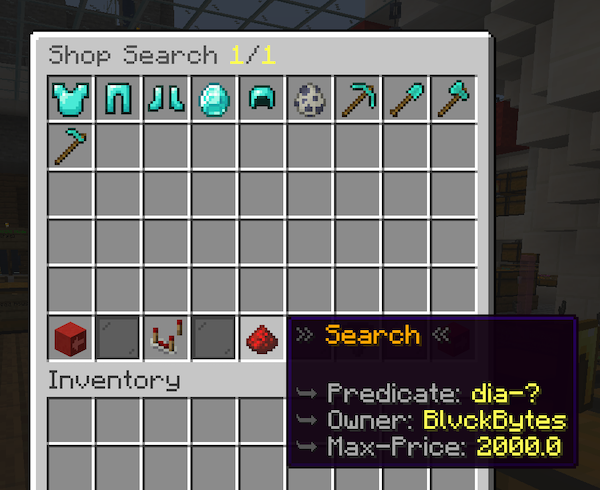

Remote Interaction
Interact with shops from any arbitrary distance, be it within the same world, or even across worlds! The requests to sell and buy items will be relayed to the shop and handled natively, thereby ensuring proper transactional consistency. On top of said convenience, the user now also receives proper information about the limiting-factor of the maximum number of units to be bought/sold - no more guesswork!
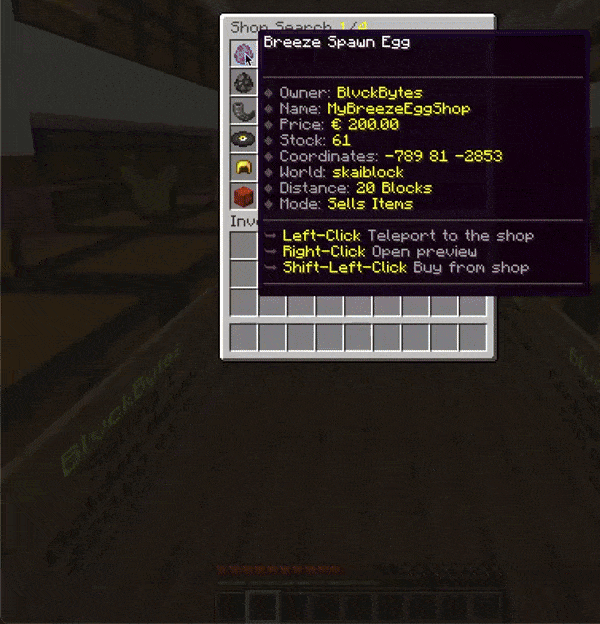
Distance-Fees
When interacting with shops remotely, fees based on distance may be configured; see the Distance-Based Fees documentation. Said fees are also taken into account when calculating maximum units and are withdrawn before initiating a remote shop-interaction; if the interaction fails or stalls, the fees are refunded after the configured timeout period; if the fees could not be withdrawn in the first place, the remote interaction is cancelled immediately. Fees may be relative (percentage) and/or absolute (fixed value) - they are customizable by distance-range, world and permission.
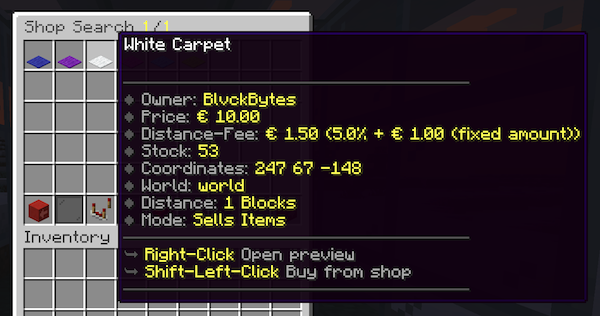
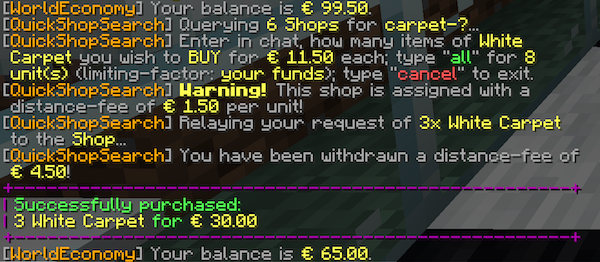
Powerful Predicates
Thanks to the feature-rich syntax as provided by the ItemPredicateParser, queries can be as simple or as detailed as you desire them to be; the days of having to flip through hundreds of unspecific results are finally over!

Slow Teleport
When teleporting to a shop, there are many options to constrain this feature, like Slow Teleport and Teleport Cooldowns, where the former takes factors like the player's movement as well as combat into account, while the latter ensures a prevention of spam as well as to avoid misusing shops to set homes for rapid travel.
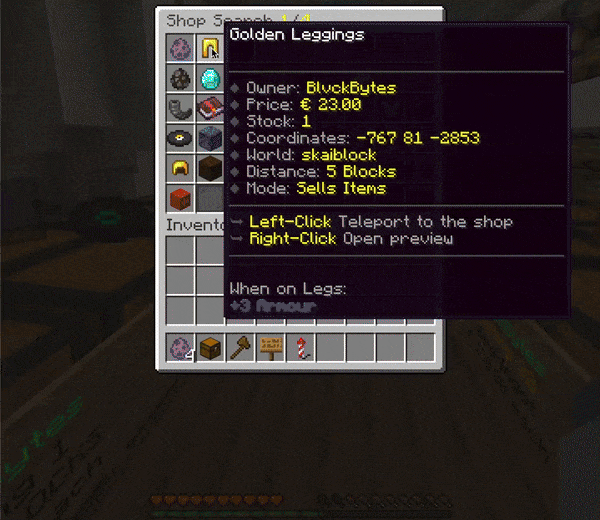
Teleport Destinations
Since shops always can be corresponded with the physical location of their container, this destination makes for the default when teleporting to a shop; if configured, various auxiliary points like the closest player-warp may also be offered to teleport to; I'm planning on adding as many such secondary-location-providers as the community would like to have! :)
In order to display them in a detailled manner and offering the user as much freedom of choice as possible, they're displayed in a separate display, which only opens if there are more than one choices available.
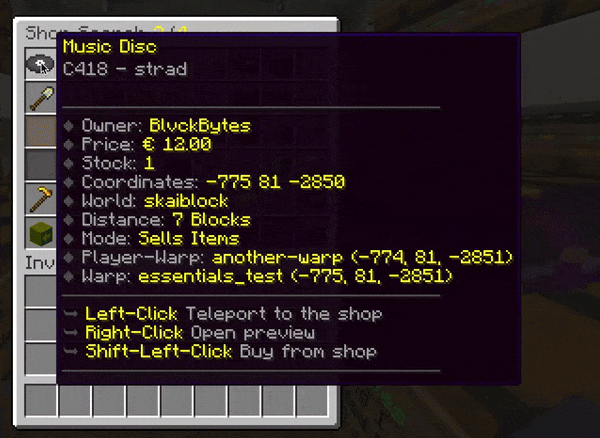
Commands
Please familiarize yourself with the syntax of predicates over at the Parser's Documentation. Results are, if any, offered within a paginated display.
Selected Language
Usage: /qss [search-flags] <predicate>
To query all globally existing shops using the personal language currently selected via /ipp Language <Language>, use /quickshopsearch or its alias /qss, followed up by an optional predicate.
Custom Language
Usage: /qssl <language> [search-flags] <predicate>
To query all globally existing shops using any of the languages supported by the predicate-parser, use /quickshopsearchlanguage or its alias /qssl, followed up by the language, followed up by a predicate.
Advertise Command
Usage: /qs advertise
Toggles the is-advertising state of the shop currently looked at, indicating whether it'll show up on the shop-browser. By default, no shop is advertising, as it's an opt-in choice. These states are simply stored on the shop-sign's PersistentDataContainer as a single byte, being either 0 or 1. There exists a bypass-permission for admins, so they can still view all globally existing shops - see the permissions-section of this page.
Reload Configuration
Usage: /qssrl
The configuration can be reloaded at any point in time, simply by running /quickshopsearchreload or its alias /qssrl; this also affects open displays and will update the inventory-title as well as all rendered items.
Permissions
quickshopsearch.command.qss: Invoke the main commandquickshopsearch.command.qssl: Invoke the language commandquickshopsearch.command.qssrl: Invoke the reload commandquickshopsearch.empty-predicate: Query all shops without a predicatequickshopsearch.other-world: Whether to display shops which are not in the same world as the playerquickshopsearch.feature.sort: Use the sorting featurequickshopsearch.feature.filter: Use the filtering featurequickshopsearch.feature.teleport.shop: Teleport to the location of the shopquickshopsearch.feature.teleport.player-warp: Teleport to the location of the nearest player-warpquickshopsearch.feature.teleport.essentials-warp: Teleport to the location of the nearest essentials-warpquickshopsearch.feature.teleport.bypass-cooldown.same-shop: Bypass the teleport cooldown for the same shop within the player's worldquickshopsearch.feature.teleport.bypass-cooldown.any-shop: Bypass the teleport cooldown for any shop within the player's worldquickshopsearch.feature.teleport.other-world: Teleport to locations within another worldquickshopsearch.feature.teleport.other-world.bypass-cooldown.same-shop: Bypass the teleport cooldown for the same shop within a foreign worldquickshopsearch.feature.teleport.other-world.bypass-cooldown.any-shop: Bypass the teleport cooldown for any shop within a foreign worldquickshopsearch.feature.interact: Remotely interact with shops within the same worldquickshopsearch.feature.interact.other-world: Remotely interact with shops within another worldquickshopsearch.feature.search-flag.owner: Use the shop-owner search-flagquickshopsearch.feature.search-flag.radius: Use the radius distance search-flagquickshopsearch.feature.search-flag.price: Use the shop-price search-flagquickshopsearch.feature.search-flag.min-price: Use the shop-min-price search-flagquickshopsearch.feature.search-flag.max-price: Use the shop-max-price search-flagquickshopsearch.access-list.<suffix>: Control access-lists by permission, see Access-Listsquickshopsearch.bypass-access-lists: Bypass all access-lists, see Access-Listsquickshopsearch.command.advertise: Invoke the toggle-advertise sub-command of quickshop.quickshopsearch.command.advertise.owner-bypass: Invoke the toggle-advertise command for shops you're not the owner of.quickshopsearch.bypass-non-advertise: View all shops, no matter whether they're advertising.quickshopsearch.bypass-slow-teleport: Bypass having to wait for the teleportation-countdownquickshopsearch.feature.teleport.nearest-player-warp.ban-bypass: Bypass player-warp bans when teleportingquickshopsearch.feature.fees.bypass: Bypass fees for shops within the same worldquickshopsearch.feature.fees.bypass.other-world: Bypass fees for shops within another worldquickshopsearch.feature.fees.permission-name.<name>: Access permission-guarded fees with a name of<name>quickshopsearch.command.advertise.allowlist-bypass: Bypass the allow-list of regions when advertising owned shopsquickshopsearch.command.advertise.allowlist-bypass.others: Bypass the allow-list of regions when advertising foreign shops
Performance Concerns
Since it's totally reasonable to be concerned with the performance-impact a plugin like this could cause, I want to provide some ballpark measurements and insights into the whole process; after all, it's doing a lot: parsing complex predicates, querying all global shops, rendering customizable preview items and reflecting shop-changes immediately in all open search-windows.
First and foremost, all of the previously mentioned tasks are executed asynchronously. Secondly, all globally existing shops are queried once on startup and then cached, while newly created or removed shops are of course tracked too; this includes caching not only the remaining stock and space (as to avoid needless inventory slot scans), but also takes care of the configurable display item template.
Even complex predicates take only roughly two milliseconds to parse. Where the system really shines is the speed of predicate execution, which - for rather nuanced queries - lies at around 5 nanoseconds per Shop; on a reasonably large server with, for example, 100k shops, a query would take merely half a second.
Rendering a full GUI-page, including page-items and controls, takes around two to two four milliseconds. Over all, I believe that the performance of this plugin is within an acceptable range; if you ever encounter any issues, please report back to me, so that I have further motivation to improve efficiency.